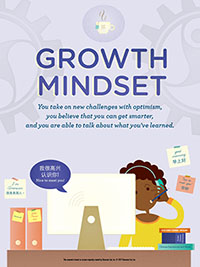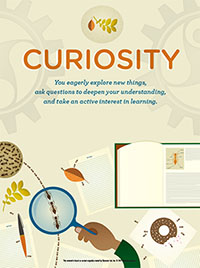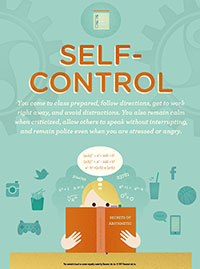At iLEAD Schools, we maintain a unique emphasis on using methods that foster our learners’ social-emotional learning and personal strengths. We are committed to ensuring our students learn to lead, be self-directed, and develop their emotional IQ in a way that inspires creativity and engagement in their coursework. We believe it’s vital to help students develop skills like social awareness, self-management, regulation of emotions, and self-awareness early so they can begin to weave these abilities through every facet of their lives.
As an integral part of our approach to teaching, implementation and evaluation of Social-Emotional Learning (SEL) principles is inseparable from our project-based learning model, which requires learners to research, collaborate, and carefully weigh information and evidence in a nuanced problem-solving context and teaches them to accept feedback, create solutions, and present their findings in a high-performance context.
To accomplish this vital mission, we measure and report SEL progress as part of every project, individualized learning plan goal, and Report of Progress. We have also developed SEL and academic rigor rubrics that add a well-balanced approach to academics and reflective practice for facilitators, learners, parents, and administrators. Other elements of our SEL implementation, practice, and assessment include Learner-Led Conferences (LLCs), Presentations of Learning (POLs), Passion Projects, Individualized Learning Plans (ILPs), Advisory Program, learner-driven ambassador groups, Morning Meetings, and restorative approaches to discipline, among others.
To adapt to an increasingly globalized economy, education must emphasize more than instilling rote knowledge. Students must be prepared to be empathetic, critical thinkers who thoughtfully and significantly engage with the world around them. We know that modern employers prize these skills in the workplace, and research suggests that employees with more highly developed social-emotional strengths earn more and are more productive. And according to the nonprofit, nonpartisan think tank Economic Policy Institute, focusing on non-cognitive skills may actually further improve reading, writing, and mathematics performance in kids.
All this work continues at iLEAD. When we started SCVi, our first iLEAD school, we laid the foundation of our program on the concept of nurturing the whole child by blending academic rigor with meaningful engagement, sustained inquiry, and social-emotional learning principles. As our schools grew, we remained committed to weaving opportunities to develop a strong social-emotional foundation into our everyday curriculum. We’ve worked with the International Baccalaureate (IB) program’s global headquarters in The Hague, Netherlands, to develop programs aimed at launching social-emotional initiatives across the globe, and we’re also part of a pilot program aimed at integrating compassion into education, which was created by a consortium of professionals from IB, the Massachusetts Institute of Technology, and Pennsylvania State University, among others.
As an integral part of our approach to teaching, implementation and evaluation of Social-Emotional Learning (SEL) principles is inseparable from our project-based learning model, which requires learners to research, collaborate, and carefully weigh information and evidence in a nuanced problem-solving context and teaches them to accept feedback, create solutions, and present their findings in a high-performance context.
To accomplish this vital mission, we measure and report SEL progress as part of every project, individualized learning plan goal, and Report of Progress. We have also developed SEL and academic rigor rubrics that add a well-balanced approach to academics and reflective practice for facilitators, learners, parents, and administrators. Other elements of our SEL implementation, practice, and assessment include Learner-Led Conferences (LLCs), Presentations of Learning (POLs), Passion Projects, Individualized Learning Plans (ILPs), Advisory Program, learner-driven ambassador groups, Morning Meetings, and restorative approaches to discipline, among others.
What is the value of Social-Emotional Learning?
In the article “Reconsidering Rigor in Schools,” Dr. Thom Markham writes: “There is a momentous, broad-based cultural shift underway that has struck at the roots of every industrialized system of education. The result is a demand for more personalized learning, brain-friendly environments, less recall, and more thoughtful application of knowledge, optimal conditions for eliciting intelligent behaviors, constructivist tools, and respectful, caring relationships that honor the learner.”
In the article “Reconsidering Rigor in Schools,” Dr. Thom Markham writes: “There is a momentous, broad-based cultural shift underway that has struck at the roots of every industrialized system of education. The result is a demand for more personalized learning, brain-friendly environments, less recall, and more thoughtful application of knowledge, optimal conditions for eliciting intelligent behaviors, constructivist tools, and respectful, caring relationships that honor the learner.”
To adapt to an increasingly globalized economy, education must emphasize more than instilling rote knowledge. Students must be prepared to be empathetic, critical thinkers who thoughtfully and significantly engage with the world around them. We know that modern employers prize these skills in the workplace, and research suggests that employees with more highly developed social-emotional strengths earn more and are more productive. And according to the nonprofit, nonpartisan think tank Economic Policy Institute, focusing on non-cognitive skills may actually further improve reading, writing, and mathematics performance in kids.
All this work continues at iLEAD. When we started SCVi, our first iLEAD school, we laid the foundation of our program on the concept of nurturing the whole child by blending academic rigor with meaningful engagement, sustained inquiry, and social-emotional learning principles. As our schools grew, we remained committed to weaving opportunities to develop a strong social-emotional foundation into our everyday curriculum. We’ve worked with the International Baccalaureate (IB) program’s global headquarters in The Hague, Netherlands, to develop programs aimed at launching social-emotional initiatives across the globe, and we’re also part of a pilot program aimed at integrating compassion into education, which was created by a consortium of professionals from IB, the Massachusetts Institute of Technology, and Pennsylvania State University, among others.











